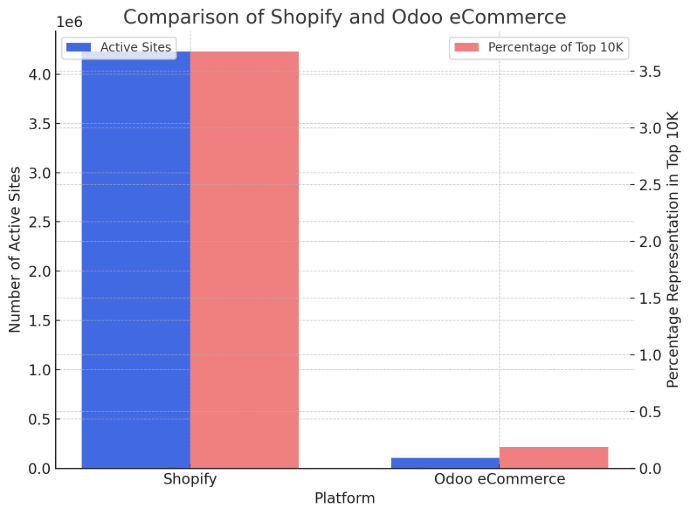Why we choose the External approach to facilitate AI solutions for Odoo?
Odoo is known for its ability to integrate a wide range of business processes in one place, from sales and accounting to inventory management and CRM. This versatility is one of its greatest strengths, but it can also be a limitation. For example, in the e-commerce sector, Odoo cannot compete with specialized platforms like Shopify or Magento, which are optimized to offer advanced and specific functionalities for online stores.
The same applies when we talk about artificial intelligence (AI). While Odoo allows integrating AI solutions within its ecosystem, it is not specifically designed to be an advanced AI system, like dedicated external frameworks would be TensorFlow or OpenAI. These frameworks are specialized in providing much more powerful and efficient machine learning and natural language processing solutions.

The Advantage and the Weakness of Odoo in AI Integration:
Just like with e-commerce, when it comes to integrating AI into Odoo, internal solutions cannot always compete with specialized platforms that are at the forefront of this field. However, instead of limiting ourselves to Odoo's internal capabilities, our strategy has been to integrate external AI frameworks through APIs. This integration allows us to take advantage of the latest AI advancements while maintaining the user experience within Odoo, offering a unified interface. It also opens the door to connect Odoo with external platforms such as Shopify, Hubspot, Salesforce, and many others, without losing the centralization and efficiency of an ERP.
With this approach, we not only advance with cutting-edge technologies but also align our product with the new paradigm shift in ERPs, where specialized tools are integrated without compromising the user experience.
Discover how our artificial intelligence can transform your processes in Odoo!

Comparison: AI Framework for Odoo vs External Framework (Open Source)
Next, we analyze the key differences between developing an AI framework for Odoo from scratch or using an external open-source framework, based on several key aspects.
| Aspect | Develop an AI Framework for Odoo | Use External Framework (Open Source) |
|---|---|---|
| Development and Maintenance | You will need a dedicated team to develop and maintain the system. The effort is considerable, especially with Odoo updates. | Using an existing framework reduces the development and maintenance effort, but it may be necessary to adapt it to your specific needs. |
| Community and Support | The Odoo community is likely to be smaller when it comes to AI, which limits external support sources. | Open-source frameworks generally have active communities that provide support, updates, and continuous improvements, making it easier to solve problems. |
| Integration with Odoo | Total and native integration with Odoo. It takes advantage of all the system's features and data consistency. | Integration with Odoo may require customization and additional work, as not all open-source frameworks are specifically designed for Odoo. |
| Flexibility and Customization | Total flexibility to adjust the framework to your business's specific needs and adapt it comprehensively. | Some open-source frameworks allow customization, but they are generally more focused on general use cases, limiting advanced modifications. |
| Adoption and Usability | It may be difficult to achieve rapid adoption due to the need for training and familiarization with a new system. | External frameworks typically have a larger user base and documentation that facilitates rapid adoption and training. |
Conclusion:
The decision to develop an internal AI framework for Odoo or use an external one mainly depends on the tools you are already using. For example, if you are already using platforms like HubSpot and want to integrate them with Odoo, choosing an external AI framework will allow you to use both platforms without losing the ability to work from a single interface. This eliminates the need to switch between tools, improving operational efficiency.
We believe the future of software solutions will be oriented towards a single interface, with AI agents managing the connections between different platforms. Having AI integrated directly into Odoo could limit this paradigm shift, as it doesn't allow the flexibility to connect with other specialized solutions. This is why our decision has been to connect to an external framework, which gives us the ability to continue adapting to the best available tools while maintaining a unified experience for users.
Internal or External Framework? The Key Decision for Integrating AI in Odoo